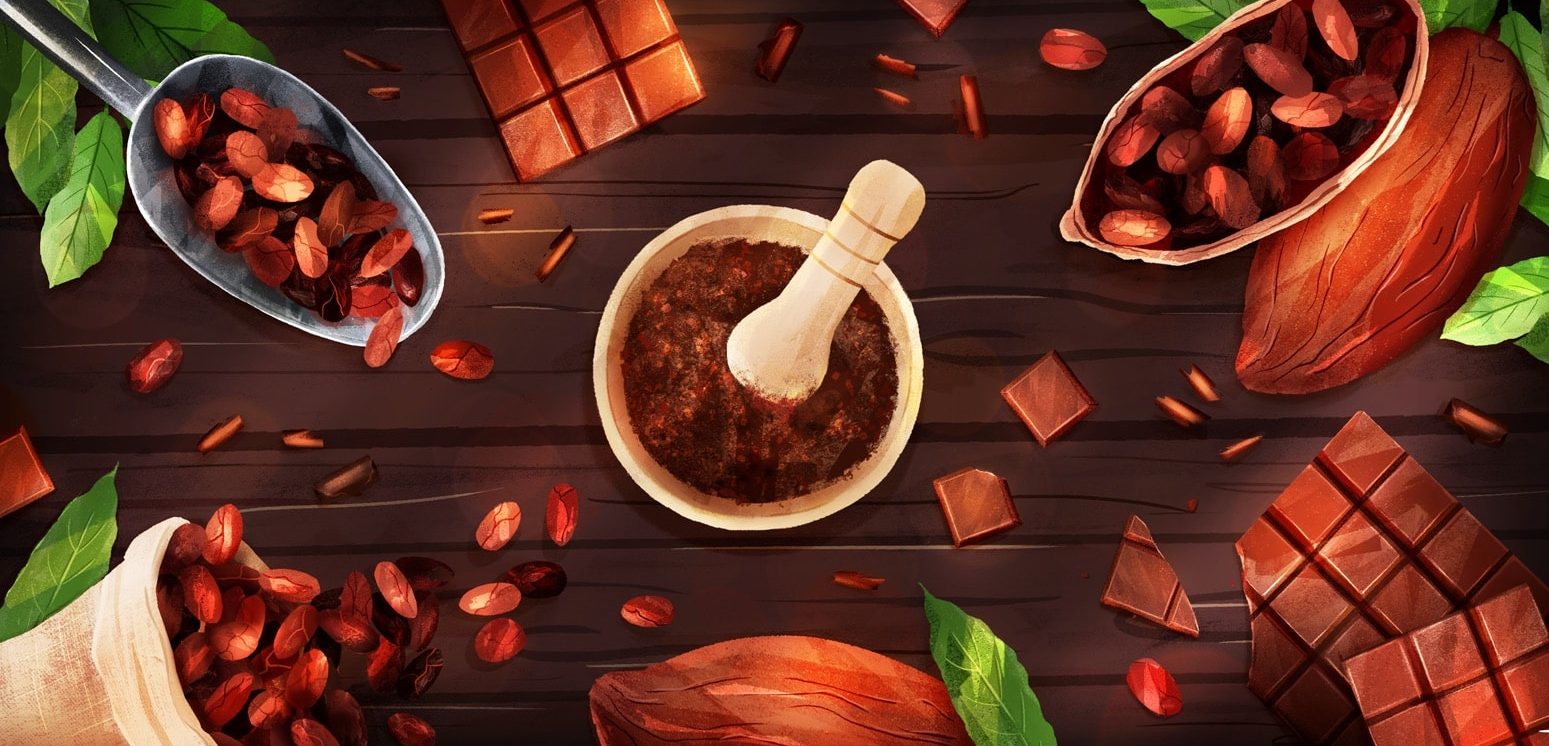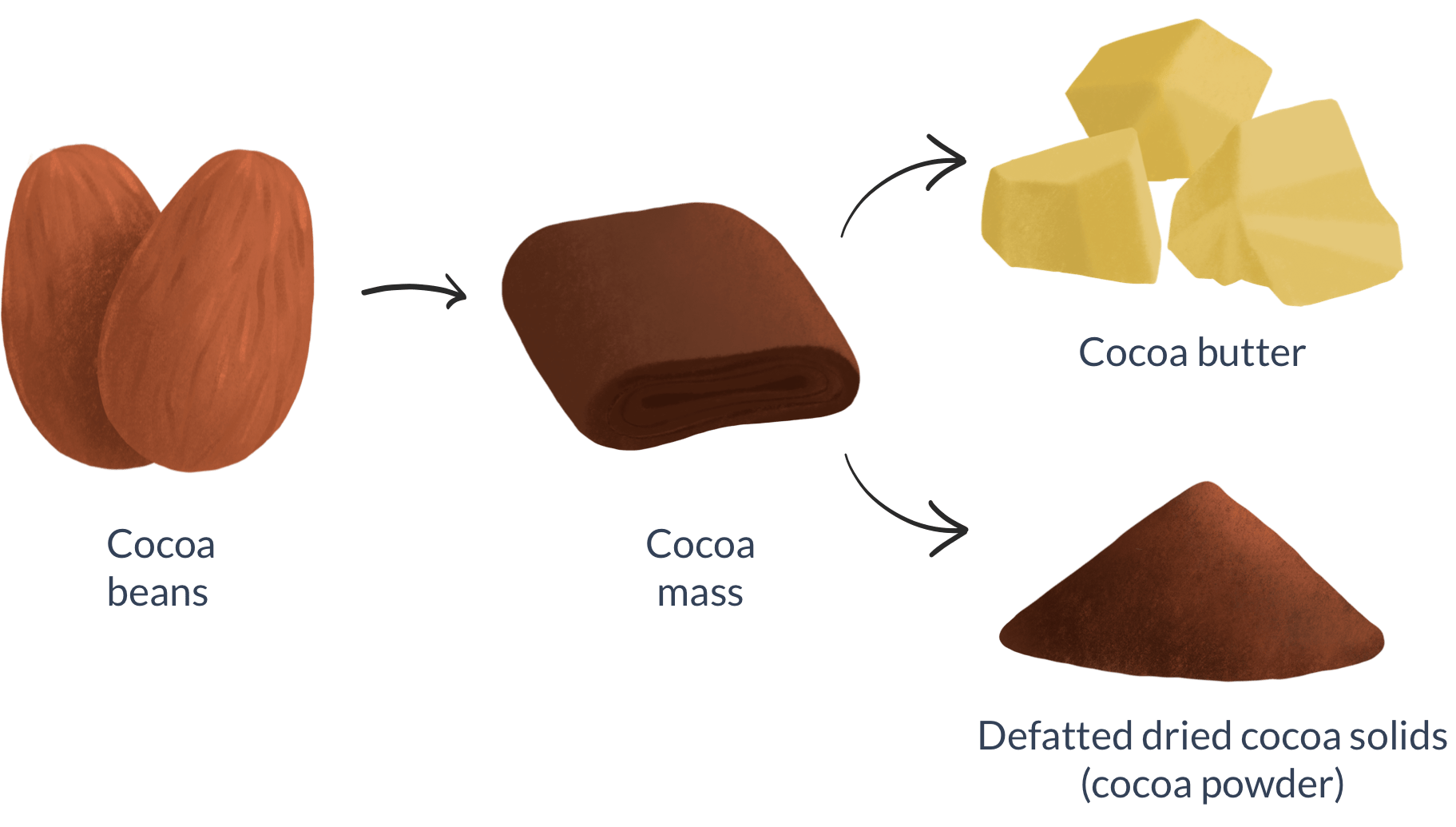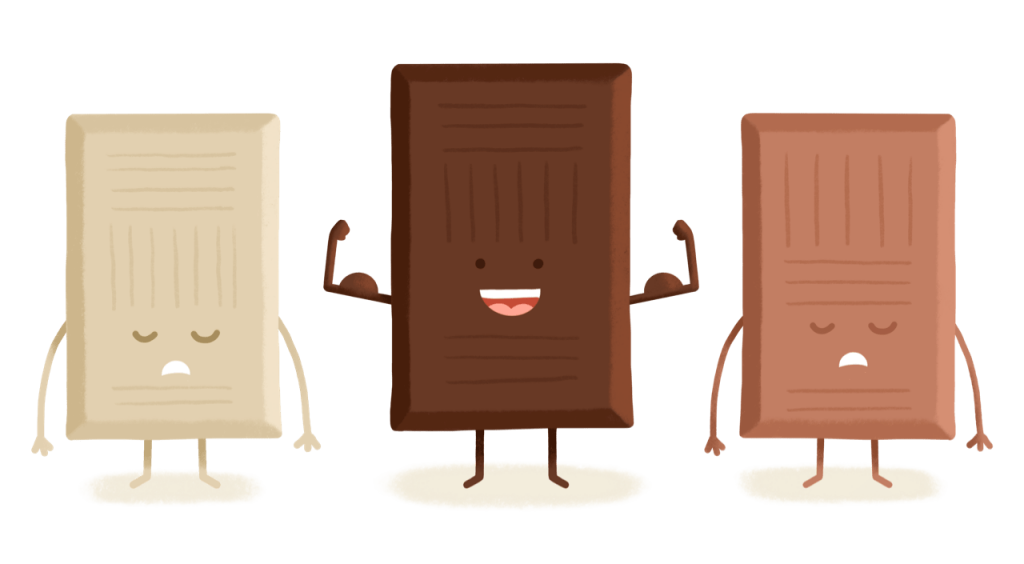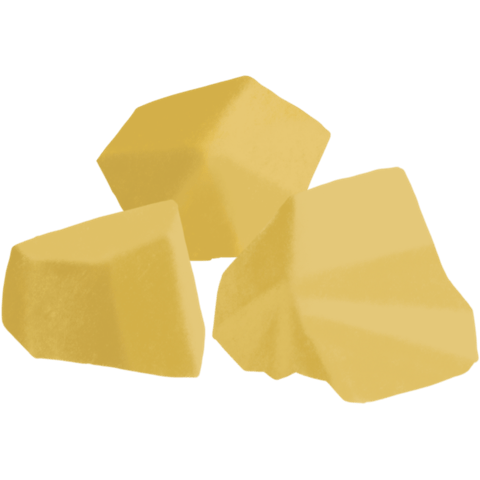
Indulging in chocolate isn’t just a treat for your taste buds; it turns out, it’s also good for your health! But the key is to choose your chocolate wisely. In this article, we take a closer look with nutritionist, Anthony Berthou.
Understanding what goes into chocolate
Chocolate is made from cacao beans harvested from cocoa trees. It has three main ingredients:
- Cocoa mass: Also known as chocolate liquor, it is made from ground cacao beans. Cocoa mass naturally contains 55% cocoa butter and 45% cocoa solids.
- Cocoa butter: It is obtained by cold pressing cacao beans, which separates the cocoa butter from the cocoa solids.
- Sugar

The cocoa percentage given on chocolate bars reflects the amount of cacao contained in the chocolate, namely, the cocoa mass (a mix of cocoa butter and cocoa solids) and cocoa butter.
Extraordinary antioxidant powers
Cacao has extraordinary antioxidant powers, so it contributes to the prevention of cardiovascular diseases, neurodegenerative disorders and even cancer (read our post about antioxidants).
Its protective benefits are concentrated in the cocoa mass, or cocoa powder, which is rich in polyphenols, the most powerful antioxidants. Therefore, the higher the cacao content in the chocolate, the greater its antioxidant properties. This is why dark chocolate packs the most antioxidants. A single square of 70% dark chocolate contains twice as many polyphenols as a glass of red wine and just as much as a cup of green tea that has been steeped for a long time. The antioxidant content of milk chocolate, however, is rather low and white chocolate has none because it does not contain any cocoa solids.
Consuming 0.7 oz (20 grams) of at least 70% dark chocolate each day (or two small squares) gives the body a valuable dose of antioxidants and works as a precious health food. The best time to enjoy it is with an afternoon snack.

Additional benefits of chocolate
Chocolate is also very rich in magnesium thanks to its cacao content. Dark chocolate contains nearly twice as much magnesium as milk chocolate. Magnesium deficiency is relatively common: nearly 70% of the adult population may not get enough magnesium. These shortfalls can result in fatigue, sleep disorders and irritability.
Because chocolate also contains sugar, it optimizes the action of serotonin, a neurotransmitter that is a key determinant of mood. It encourages feelings of calm and wellness. Cacao may also play a part in mood regulation through the presence of a special compound, theobromine.
Finally, some of the antioxidants contained in chocolate (flavonols) may promote the growth of intestinal bacteria that are good for our health, meaning they may be beneficial to the intestinal flora.
What about chocolate’s environmental impact?
Chocolate is a hallmark of the holidays and a favorite for gift giving and indulgence, which means worldwide demand for chocolate continues to grow. To meet this soaring demand, forests are being cleared to plant new cacao trees. The chocolate industry may be the leading cause of deforestation in Côte d’Ivoire and Ghana. Furthermore, growing cacao trees takes a heavy toll on water resources.But the situation is starting to improve: several large chocolate companies and cacao brokers are shifting toward “zero deforestation” policies.
Thus, it is best to limit your chocolate intake – and especially to avoid consuming the low-quality chocolate that is widely gifted around holidays. Whenever possible, opt for fair trade chocolate, which imposes somewhat stricter environmental criteria.
Choosing chocolate wisely
Here are some factors to consider to choose a chocolate wisely:
 | Pick a dark chocolate that contains at least 70% cacao, because the cocoa powder contains all the benefits of chocolate. Ideally, try to make a gradual transition to 90% chocolate. |
 | Check the list of ingredients. Chocolate only requires basic ingredients: cocoa mass (or liquor), sugar and cocoa butter. Avoid chocolate that contains flavorings or additives such as lecithins. |
 | Choose "pure cocoa butter" chocolate. Some mass manufacturers use less expensive fats such as palm oil or shea butter. |
 | Opt for organic chocolate because cacao bean plantations are also susceptible to extensive use of pesticides. |
Chocolate is still a high-calorie food that contains fat. So, you should limit your intake to two or three squares of 70% dark chocolate per day: that is enough to reap its benefits. One interesting option is to eat raw cocoa powder, which has very little sugar and fat. You can sprinkle it over your dishes or desserts.
- http://www.sante-et-nutrition.com/chocolat-nutrition/
- Katz DL, Doughty K, Ali A. Cocoa and chocolate in human health and disease. Antioxid Redox Signal. 2011;15(10):2779–2811.
- https://ciqual.anses.fr/
- Martín-Peláez S, Camps-Bossacoma M, Massot-Cladera M, Rigo-Adrover M, Franch À, Pérez-Cano FJ, Castell M. Effect of cocoa's theobromine on intestinal microbiota of rats. Mol Nutr Food Res. 2017 Oct;61(10).
- Magrone T, Russo MA, Jirillo E. Cocoa and Dark Chocolate Polyphenols: From Biology to Clinical Applications. Front Immunol. 2017 Jun 9;8:677.
- Nanetti L, Raffaelli F, Tranquilli AL, Fiorini R, Mazzanti L, Vignini A. Effect of consumption of dark chocolate on oxidative stress in lipoproteins and platelets in women and in men. Appetite. 2012 Feb;58(1):400-5.
- Rev. Med. Suisse, 2009, 239, 34716.
- J. Pharm. Belg., 2002, 57, HS2, 29-34.
- Etude SU.VI.MAX (SUpplémentation en VItamines et Minéraux Anti-oXydants), Dr S. Hercberg , 1994 -2003.
- https://www.notre-planete.info/actualites/1865-chocolat-environnement-deforestation
- http://www.mightyearth.org/wp-content/uploads/MEO_001_Chocolate-Report_french_FOR-WEB.pdf
- https://waterfootprint.org/en/








Can you make suggestions on healthy chocolates/brands?
Thanks.
How come your app says 0 out of 100 on chocolate milk than?
Your app is very good. I am 77 years old and I am discovering a lot from your app. I have changed a lot of my things. This app is very useful but I’d love to know what’s the best best Butter to use. I have high cholesterol so I would love to know, I What? butter don’t forget, I live in Ireland so it should be whatever we are here. Eileen.
I used cocoa powder, is it dark chocolate or not?
Is ceremonial cacao better than organic cacao there is no research that to Cal produces new stem cells is that true
Have you checked chocolate for heavy metals. Not sure if it’s true but I heard pretty well all are loaded with heavy metals way over the recommendation.
So I am curious as to why you are not flagging and instead promoting organic chocolate when it contains some lead and cadmium. You give very low ratings for all other non organic chocolate because you say they might contain pesticides. I would rather have the pesticides. This makes zero sense, and demonstrates that you will make exceptions to your rules. Also, not all non organic chocolate is at risk for pesticides. Some manufacturers just do not want to go through the expense of procuring the label.
I really love this app, support it, and use it regularly. But, it has to continue to be consistent, logical, and not make exceptions.
You may have change your rating system for organic chocolate since you received so much feedback and texts regarding this issue. I did not check right before I wrote this.
Organic is nothing but approved chemicals it doesn’t mean it’s grown organic. Nothing grown for the public for sale is sprayed with something.
When me and my siblings would fight over if chocolate is good for you, I would just bring up this article. So thank you Yuka, for giving me healthy food options.👏
I love Yuka♥️
You have changed my life. I don’t buy anything unless I scan it first.
Lately I’ve been hearing media reports that are claiming that there are high levels of lead in dark chocolate. Is this true?
I always new dark chocolate was good for you but it’s great to know that some manufacturers are taking the environment into account.
I’m so glad 😆 that I am a member and able to check on anything that I think 🤔 is questionable.
Every single dark chocolate bar I scan with your app say bad or poor even the organic ones ! Why ?
Julie, I have read about high concentrations of lead and cadmium in dark chocolate. An article today said that the organic chocolate was also contaminated. It’s not clear from the studies what the impact of this is on health. I love chocolate too! Please say it isn’t so. LOL! So far, reading about this has not impacted my daily consumption.
See Consumer Reports. The concentration of lead/cadmium is a natural something in the soil. Some brands are better than others, but almost all have it. Another reason not to overdo it.
Chocolate is a highly processed food, so lead has the potential to also get added as a trace contaminant through the manufacturing process. Check out the leadsafemama.com website for more information on countless products that contain heavy metals!
Thank you for all the information. Yuka helps me a lot.
Yuca changed my life, I really appreciate the support and honesty you guys have shown me.
I’m so addicted to yuca, and I’m telling people about it ..
thank you so so much !
With all my love and respect to you all..🙏💕
Thank you for this information. I usual don’t allow myself to have chocolate. Now I can allow myself to have a couple squares by choosing the correct one.
Would ❤️ if you’d point toward products to consider for one’s optimum health. There are some companies producing mini chocolates for daily doses. Any you’d like to list for us? Appreciate your company, have continued to share its existence on the daily for years now
I also want to say that I will be eating a square or two of dark chocolate daily. I knew it was good for you and your article really breaks it down! Thanks again!
Thank you for this article! I love YUKA! I have referred and recommended it to everyone I meet! Some have got the app! I have changed my deodorant and tooth paste, and I’ve been using better shampoos and coffees, and everything!! Thank you for all you do!
Very informative
Oops it accidentally posted twice mb
I love how you included environmental aspects too. This also reminded me of the book “The Bitter Side of Sweet” by Tara Sullivan. Definitely recommend.
I love how you included environmental aspects too. This also reminded me of the book “The Bitter Side of Sweet” by Tara Sullivan. I definitely recommend it.
GO YUKA! Huge fan/user. Also curious about the cadmium/lead risk in cacoa/cocoa powder. I mix it with almond/oat milk at night for a lowfat “milkshake” & think it has helped to lower blood pressure somewhat.
Thank you for the information which has been very help full because I eat to much of it . Yuke is amazing help
Hello 👋 Julie, I’m not a fan of chocolate, and this article is probably the reason why. I’ve been consuming the wrong chocolate, TY for this article, now I’m going to find the BEST chocolate for my health.
Thank you for the information. I have not seen cocoa butter listed on any chocolate. What are the names of the manufacturers that produce these chocolate products? Thank you.
Very good article.
YUKA is an extraordinary health support platform.
Keep the great work!
Thank you for this info on the dark chocolate and the many other good articles you have shared with the Yuka members. I use my app all the time and have shared it with many. It helps me make better and healthier choices.
Hi Julie – thank you for interesting article. Cusco Chuncho is an organic dark chocolate, 100% cocoa without sugar. Would be great if Yuka could rate it?
I enjoy 90% dark chocolate 1or 2 squares each night along with 2 brazil nuts. My indulgence. Definitely sleep better. No guilt
Thank you very much for this information. I only buy 70% cacao chocolate and enjoy a square once a week. From your information, i Can now enjoy it more often. I have a delicious easy mousse recipe using the chocolate with silken tofu and vanilla. Yum.
I enjoy receiving information like this. Continue your good work.
PS. I always scan any new product before purchasing. I’m always surprised that the package information says healthy, but Yuka says poor or bad.
That was a very interesting read. Thank you
Since discovering your app I have shared it with many people. I find it so helpful when shopping to determine if I’ll buy the product. Your articles are fabulous. Keep up the good work.
Gy
Very interesting!! I’ll definitely keep in mind to try raw powder cocoa powder and also will pay attention to lecithin listed in the ingredients.
I only eat dark chocolate with more than 70% cocoa mass inside. Already for years. But still I keep encountering very tasty kinds and not to my taste at all though all say organic and 70%. Thank you for the input, really valuable!
Thank you Julie!!!
Great information on chocolate. I liked the information in regards to deforestation.
Thanks for sharing! Love your app, very informative and helpful!
I always LOVE my DARK CHOC, that’s all I eat when eating chocolate. Thanks for this article it was very informative.
And yet Madagascan single estate 70% dark chocolate from Lidl comes up as poor in the app??
Thank you all so much for helping me to live my life as healthily as possible. The information you send out in your newsletter is amazing.
I always use your Yuka app when I’m grocery shopping…..it’s fantastic. Thank you all once again.
Thank you my lovely team for helping us to be in heath life
First class info I will change my chocolate choice from now.
As I get older, I’m always on the look out for healthier choices. Thank you for this information on dark chocolate. I’m going to include it in my diet.
Great advise on Dark Chocolate…Thanks
What are some good dark chocolates to buy?
Great informative insight to article. Thank you so much.👍👍
As always, well-written, short and to the point. Thank you.
Too much lead
DONT BELIVE THIS CRAP!! CHOCOLATE MADE ME FAT!! NO SUCH BENEFIT!! EAT YOUR FRUIT AND VEGGIE AND SAVE BECOME POPEYE!!
(Spinach and papaya typa sh*)
Try sugar free organic powder next time.
Okay, dark chocolate.What is the best dark chocolate to eat that I can buy at the grocery score
Is it lyndt or an organic kind?
As others have asked – – can you please be more specific on the brands that are best to buy?
Some Organic chocolate contains high lead and cadmium. Please be responsible in your reporting.
The only chocolate I eat now is the highest rated on your app!
Thank you, Julie, for your content. My husband and I been in Dominican couple yrs ago. And we had chance to see how Dominicans beat cocoa beans with bits to make cocoa powder. It’s very hard work. I could to send my travel Video if I have your email. That’s interesting
Here is an article which explains the percentages of these metals in various chocolate brands: https://www.consumerreports.org/health/food-safety/lead-and-cadmium-in-dark-chocolate-a8480295550/
Flavonoids in dark chocolate help stemcells produce, M&S 100% dark chocolate is a bit harsh but worthwhile eating
What about lead and cadmium? What brands test for that and make sure that the chocolate is free of these metals ?
I love dark cocoa 80 to 95%. I went to Costa Rica and I found the dark cocoa from the tree. Very interesting and taste it. Boy so good.
I love dark chocolate (75% or 70%)
It’s increase serotonin hormone in body make feel better and happy.
Can you please suggest good and standard brand chocolate 🍫?
Been using Yuka for a while and it’s changed the way I shop. From food, drink even cosmetics and toiletries.
I’m a lover of Green and Black organic so your article certainly cheered me up.
Well done and a hug thank you to you all at Yuka.
Hi Julie. I`m pleased to be a premium member. This article is very interesting particularly in the light of my testing a small intake of Cacao powder each day for last 3 months. I make up a Cacao drink slightly prior to bed and another soon after i get up in the morning along with a new breathing regime that enhances nitric oxide in my blood i am sleeping much deeper and longer rather like i`ve returned to my teens and twenties again. I`ve also read about the possibility of metals in the Cacao and would like to know more. Keep up the great work.
How about chocolate brand suggestions ?
Thank you Julie I have always loved Dark Chocolate and Have been using your app constantly since finding out about it I have even lost some weight 🙂 .I searched which dark chocolates’ that you recommend and one of them I eat.
Thanks again
Interesting article. I’m surprised nothing is mentioned about cadmium and lead which are naturally found in chocolate and can be detrimental to health and increase the risk of cancer. Was hoping there would be a guide on how to pick a chocolate with low levels of heavy metals.
I’m so glad that my lovely niece told me about Yuka, I have redefined how I read labels now and always check my Yuka app, you are doing a great service without endorsements which I highly appreciate, thank you
Very interesting article thank you:)
What about the levels of lead and cadmium found in dark chocolate?
Great info on chocolate, thanks
Good article. Love eating dark chocolate bars and have been doing so for the past 5 yrs. I only buy 86 – 92% chocolate and eating 1-2 squares at a time. I usually indulge during mid-day so it satisfies my “sweet tooth” craving but won’t affect my sleep at night. Thanks for the suggestion about buying organic didn’t realize that the farming practices of Cacao was having a negative effect on the environment.
There was a documentary once about a normal woman and they tested her blood for chemicals , they found over 300. I wondered how that was possible. With the Yuka app, I can see why. Wonderful app, thank you so much. We can stop poisoning ourselves.
The app is great especially when shopping, people look at me and think I am mad. 😄
I am pleased to read this article regarding chocolate and its benefits. thank you!
A very interesting article. I only buy 70% or more chocolate.i will try to buy organic in the future. Thank you.
Sounds great 😊
Usually stick to at least 70% thanks. I try to avoid milk/white – if given those as a present I hate to admit I usually give it away!
Very informative! Thanks for the clarity!
Good article although no mention of heavy metals! Would be really interested in an update and more info about which chocolate bars have more / less.
Thank you for this information I love dark chocolate but stopped eating it do to diabetes.. I’ve got my blood sugar down without medication so I can indulge in a wee treat .. I use your app when out shopping it’s a god send
Interesting read, totally agree with this all, love the yuka app, keep up the good work!!
Very interesting . Thank you
Thank u for your emails and everything I love your app! I wish I could talk in person to someone don’t have a credit card call me sometime 845-706-9399
Hi Julie,
A little confused, my Naturopath said that there is Lead and cadmium in almost all chocolates. I googled it and confirmed that this is true.
On a side note luv using your Yuca app!
Keep up the good work,
Bob
Yuka has been a wonderful companion, helping me become more conscious and discerning with my grocery choices through the app. I truly appreciate this information on chocolate, among the various topics you share from time to time. Please keep it up!!
Win win
Very interesting facts, thank you for sharing.
Thanks for this great article. I have heard that cacao and cocoa powder contain cadmium and should be avoided. What are your thoughts on this as I had always thought plain cacao or cocoa powder was fine in my daily smoothie and now I’m unsure how often I should be eating it. Any advice would be welcome. Thank you.
I’ve heard that chocolate also contains a large amount of lead, some more than others which are absorbed from the soils. Is this accurate. And if so which ones are safer?